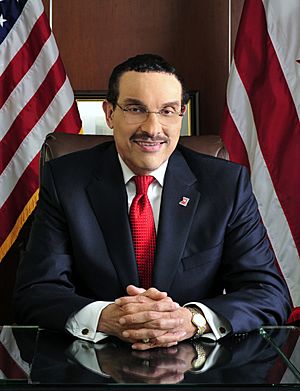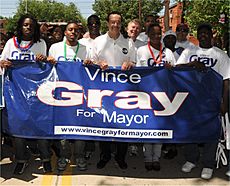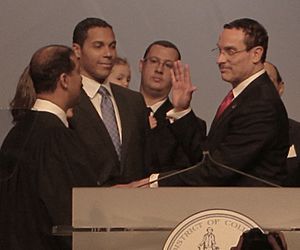Vincent C. Gray facts for kids
Quick facts for kids
Vincent Gray
|
|
|---|---|
 |
|
| Member of the Council of the District of Columbia from Ward 7 |
|
| In office January 2, 2017 – January 2, 2025 |
|
| Preceded by | Yvette Alexander |
| Succeeded by | Wendell Felder |
| In office January 2, 2005 – January 2, 2007 |
|
| Preceded by | Kevin Chavous |
| Succeeded by | Yvette Alexander |
| Mayor of the District of Columbia | |
| In office January 2, 2011 – January 2, 2015 |
|
| Preceded by | Adrian Fenty |
| Succeeded by | Muriel Bowser |
| 7th Chair of the Council of the District of Columbia | |
| In office January 3, 2007 – January 2, 2011 |
|
| Preceded by | Linda Cropp |
| Succeeded by | Kwame Brown |
| Personal details | |
| Born |
Vincent Condol Gray
November 8, 1942 Washington, D.C., U.S. |
| Political party | Democratic |
| Spouses | Loretta (deceased 1998) Dawn Kum (2019–present) |
| Children | 2 |
| Education | George Washington University (BS) |
Vincent Condol Gray (born November 8, 1942) is an American politician. He served on the Council of the District of Columbia representing Ward 7 from 2017 to 2025. He was also the mayor of the District of Columbia from 2011 to 2015.
He served one term as mayor. He lost his reelection bid in 2014 to D.C. Council member Muriel Bowser. Before becoming mayor in 2011, Gray was the chairman of the Council of the District of Columbia. He also served as a councilmember for Ward 7. In the 1990s, he was the director of the DC Department of Human Services. In 2016, he won the Democratic primary for the Ward 7 council seat he had held before.
Contents
Early Life and Career
Vincent Gray was born in Washington, D.C., on November 8, 1942. He graduated from Dunbar High School. In 1964, he earned a degree in psychology from George Washington University. He also took advanced classes there. Gray was one of the first African Americans to join the Jewish fraternity Tau Epsilon Phi. He was the first person to be president of the fraternity for two terms in a row. He also played football and basketball in college. Gray enjoys hand dancing, a dance style from the D.C. area.
Gray started his political career with the D.C. Arc. There, he worked to create new public policies. These policies helped people with intellectual disabilities. In 1991, Mayor Sharon Pratt Kelly appointed Gray to lead the DC Department of Human Services.
In 1994, Gray became the first executive director of Covenant House Washington. Over ten years, this agency grew from a small outreach program. It became a large organization helping homeless youth in the city's Southeast and Northeast areas.
Serving on the D.C. Council
In the September 2004 election, Gray won against Kevin P. Chavous. Chavous was the current Ward 7 member of the D.C. Council. Gray then won the general election in November with 91% of the votes. He officially became a council member on January 2, 2005. He served on committees for Health, Economic Development, Human Services, and Education. Chairman Linda W. Cropp also asked him to lead a special committee. This committee focused on preventing youth violence.
In 2006, Chairman Cropp decided to run for mayor instead of another term as chairman. Gray then ran for chairman. He won against his council colleague Kathleen Patterson in the Democratic primary. He then won the general election without anyone running against him. Gray's campaign was called "One City." It focused on bringing together different groups in Washington, D.C.
In 2008, Gray helped pass the "Pre-K Enhancement and Expansion Act of 2008." This program aimed to provide free pre-kindergarten for all three- and four-year-olds in D.C. by 2014. It also aimed to improve early support services for students.
Becoming Mayor of D.C.
2010 Mayoral Campaign
Gray officially joined the race for Mayor of the District of Columbia on March 30, 2010. His campaign used the slogan "One City. Leadership We Need." This slogan was popular when he was Council Chairman. A poll in January 2010 showed Gray ahead of the current mayor, Adrian Fenty. Gray won the election against Fenty by over 13,000 votes.
Mayor's Actions and Policies
To save the District $19 million in 2011, Gray suggested unpaid days off for most District employees, including teachers. Workers would not be paid on four holidays. The District Council approved this idea. On Presidents' Day, February 21, 2011, some 911 emergency calls were not answered. This happened because dispatchers were on unpaid leave.
Gray was against a proposal from Congress to restart a school voucher program in the District.
On April 11, 2011, during debates on the 2011 United States federal budget, Mayor Gray joined D.C. residents in protest. They were outside the Hart Senate Office Building. They protested budget rules that limited the city's use of its own money. The budget limited spending on certain health services. It also brought back a school voucher program that the city government did not support. U.S. Capitol Police arrested several protesters, including Vincent Gray, for blocking traffic. Gray stated that the city should be able to spend its own money.
Campaign Concerns
During Gray's time as mayor, there were questions about some of his staff hires. One person hired was Sulaimon Brown. He had been a minor candidate in the 2010 mayoral election. He had also spoken against the previous mayor, Adrian Fenty. When news came out about Brown's past, he was fired.
Brown then claimed he had a secret agreement with Gray during the 2010 campaign. He said he was promised a job if Gray won. He also claimed to have received cash payments from Gray's campaign aides. Gray denied these claims. He admitted there were "missteps" in hiring and asked for an investigation. Federal officials began looking into the allegations. More reports came out about hiring practices in Gray's administration. These included claims of hiring relatives of high-level officials.
In October 2011, The Washington Post reported that federal officials were investigating Gray's 2010 campaign finances. They were looking into possible illegal donations. In May 2012, Gray's campaign treasurer, Thomas Gore, admitted to illegally moving campaign money. He also admitted to destroying documents. Two days later, Howard Brooks, another campaign official, admitted to lying to investigators. He said he gave money to Sulaimon Brown.
In July 2012, a third campaign official, Eugenia Clarke-Harris, admitted to campaign corruption. She said Gray's campaign had a secret "shadow campaign." This campaign used $650,000 in illegal money from a wealthy contractor, Jeff Thompson. Gray was not charged with any wrongdoing. No proof showed he knew about the shadow campaign. However, the U.S. Attorney said the mayor was still under investigation.
Gray said his campaign had "issues" but denied he would resign. Some D.C. Council members asked Gray to resign. A poll showed that most D.C. residents thought Gray should resign.
In March 2014, the U.S. Attorney claimed Gray knew about Thompson's plan. This plan involved over $660,000 in illegal donations. Prosecutors said Gray and Thompson had a plan to hide Thompson's identity. They said Gray referred to Thompson as "Uncle Earl."
In December 2015, prosecutors stopped the investigation into Gray's campaign. They said there was not enough evidence. In April 2016, documents about the investigation were released. They showed prosecutors did not charge Gray because they were unsure about Thompson's reliability as a witness.
2014 Mayoral Campaign
On December 2, 2013, Gray announced he would run for reelection. On April 1, 2014, Gray lost the Democratic primary to D.C. council member Muriel Bowser. His loss was mainly due to the ongoing investigation into his 2010 campaign finances.
Second Term on the Council
In February 2016, Gray announced he was running to represent Ward 7 on the Council again. He said he wanted to improve healthcare access and build a new hospital in the East End of the city. On June 14, Gray won against Yvette Alexander in the Democratic primary. He was sworn into office for a four-year term on January 2, 2017.
Gray successfully ran for reelection in 2020. In December 2021, Gray had a stroke. He returned to the Council in January 2022. In December 2023, Gray announced he would not seek a third term. In October 2024, Gray shared that he had been diagnosed with early-stage dementia. He stated he would not participate in council votes for the rest of his term.
Personal Life
Gray has two children, Jonice Gray Tucker and Vincent Carlos Gray. He also has two grandchildren, Austin Gray Tucker and Jillian Gray Tucker. In 2012, it was reported that Gray had given tickets to the Verizon Center to his children. Gray said his children were "ambassadors" for the District. His daughter was named First Lady of the city.
Gray's first wife, Loretta, passed away in July 1998. In 2018, he announced his marriage to Dawn Kum. Gray lives in the Hillcrest neighborhood of Ward 7. He is Catholic.
Health Updates
Since 2021, Gray has experienced multiple strokes. He was later diagnosed with dementia. In 2024, his children filed a request to manage his affairs. They stated he had experienced several strokes. Gray's spokesperson said he had two strokes and was receiving good care. Gray was later placed under a conservatorship.
Images for kids
See also
 In Spanish: Vincent C. Gray para niños
In Spanish: Vincent C. Gray para niños
 | Delilah Pierce |
 | Gordon Parks |
 | Augusta Savage |
 | Charles Ethan Porter |




